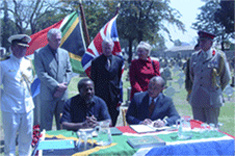History and heritage
Honouring black dead in Boer War
 Norvalspont concentration camp, one of the notorious
Norvalspont concentration camp, one of the notoriouscamps set up by the British in the Anglo-Boer War
(Image: Anglo-Boer War Museum) Boateng described the signing as a historic occasion to give fallen heroes the respect and dignity they deserve. "We welcome the support of the South African government in continuing the restoration and maintenance of Commonwealth war graves in South Africa," he said. "It is important that we do not forget all those of many lands and all races who have lost their lives in the fight for freedom and democracy."
Personal sacrifice and courage
The deal follows a 2003 report by the UK Ministry of Defence and the South African Department of Arts and Culture that revealed a need to recognise and honour those who died in the war. Boateng said there would also be an exchange programme between UK and South African schools to educate youngsters about historic wars and conflicts, and the importance of their commemoration. "The significant aspect is for children and young people in the UK and South Africa to be able to understand the story that lies behind these graves - a story of personal sacrifice and courage," he said. Although both the British and Boers initially agreed that black people were not to be used in a combatant role in the war, at least 15 000 blacks were armed by the British and served in mobile columns to track down Boer commandos. A further 25 000 served as armed blockhouse guards. Black South Africans were also used on the Imperial Military Railway system, and served as scouts, agterryers and wagon drivers. They also became refugees of the war, had their homes and livelihoods destroyed in the British scorched earth policy, and were interned in the notorious British concentration camps. SAinfo reporter
Would you like to use this article in your publication or on your website? See: Using SAinfo material
 An armed black guard escorting a Boer family to a concentration camp in the second Anglo-Boer War (Image: McGregor Museum)
An armed black guard escorting a Boer family to a concentration camp in the second Anglo-Boer War (Image: McGregor Museum)
 South African Minister of Arts and Culture Pallo Jordan and British High Commissioner Paul Boateng signing the memorandum of understanding on Boer War graves at Heroes Acre in Tshwane (Image: British High Commission)
South African Minister of Arts and Culture Pallo Jordan and British High Commissioner Paul Boateng signing the memorandum of understanding on Boer War graves at Heroes Acre in Tshwane (Image: British High Commission)




